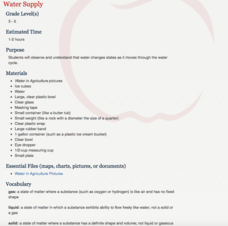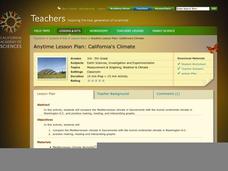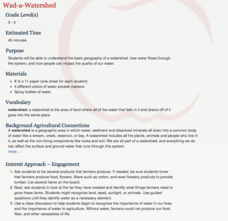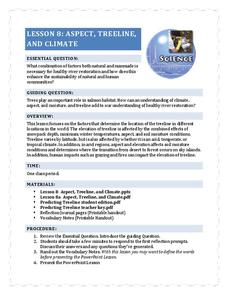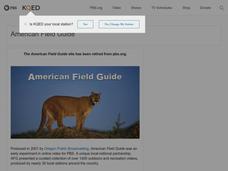National Institute of Food and Agriculture
Water Supply
Participate in three activities that look at the earth's limited water supply and the changes water goes through as it enters each phase of the water cycle. The resource is complete with three activities that demonstrate the changing...
Curated OER
Tree Riddle Book
Fourth graders study the tree identification cards, identifying conifers sheet, and western forest cards. From the information gathered from these resources, each team help create a tree riddle book of 12 trees of Washington State.
California Academy of Science
California's Climate
The United States is a large country with many different climates. Graph and analyze temperature and rainfall data for Sacramento and Washington DC as you teach your class about the characteristics of Mediterranean climates. Discuss the...
Curated OER
Tree Identification - Up Close And Personal
Fourth graders go to an outdoor area and are assigned a specific native plant to observe. They read about and answer questions about their tree. They draw the tree. Finally, 4th graders teach the rest of the class about their tree.
Curated OER
Bald Eagle Population Graphing
Pupils create graphs to illustrate the bald eagle population. They identify the population of bald eagles in Minnesota and the United States. They create three graphs to represent the population data including a line, bar, and...
Curated OER
Turning the Tide on Trash: Marine Debris Curriculum
Seven pages of fascinating reading on marine debris preface the activities in this lesson plan. Four different activities are employed to simulate how the debris is distributed in the ocean and along beaches. Early ecology learners...
Curated OER
Walter Reed's Yellow Fever Studies
Middle schoolers and high schoolers examine the ethics of using human test subjects in scientific research. They do a simulation which focuses on yellow fever and how human subjects were used to develop a treatment/cure for the disease...
National Institute of Food and Agriculture
Water Pollution Demonstration
Water pollution is everywhere, and pollutants range from oil to fertilizers. Bring the concept to life by demonstrating the difficulties in getting particular pollutants out of water.
Agriculture in the Classroom
Wad-a-Watershed
What kind of impact do humans have on watersheds? Find out in a lesson that defines, explores, and promotes ways to protect our watersheds. The ultimate goal of the lesson is for learners to discover how a watershed is impacted by...
Agriculture in the Classroom
Roll of the Genes
Animal reproduction in sheep and cattle is explored with the help of Punnet squares. Scholars employ tools using probability to conclude the color of wool a sheep's offspring will have. Acting as animal geneticists, pupils then take...
Agriculture in the Classroom
Design 'Y'er Genes
How do changes in DNA affect an organism? Scholars explore chromosomes, genes, DNA, and mutations by modeling the DNA of a strawberry. They build a DNA model, then manipulate it to show how changing the genes transforms the strawberry...
Curated OER
Turning the Tide on Trash: Marine Debris Curriculum
Six different lessons comprise this unit on marine debris. Science, language arts, social studies, and art projects make this an ideal interdisciplinary unit. The result will be well-informed future citizens who can help make a...
Curated OER
Genetically Modified Organisms
High Schoolers complete a variety of activities as they examine the ethics of (and take a position concerning) genetically modified organisms in the field of agriculture. They complete a PowerPoint demonstration to go along with the unit.
Curated OER
Blue Crabs - The Blue Crab's Chesapeake Journey
A plethora of information about the blue crabs of Chesapeake Bay will amaze and delight your marine biologists. They learn, through direct instruction, about the characteristics and life cycle of this fascinating arthropod. A highlight...
National Park Service
Aspect, Treeline, and Climate
Head to the treeline and beyond to examine how this feature of the landscape affects weather and climate, which gives scientists clues about its health. Class members' observations of photographs provide the data that drives the...
Curated OER
Salmon Vs. Dams: the Dam Removal Debate on the Elwha River
Students role-play a meeting of the Elwha River council in which they present opposing views to council members on hydroelectric power and salmon fisheries resources. They brainstorm possible conflicts between various people in land-use...
Curated OER
Exploring Building Resonance Phenomenon through a Discrepant Event Demonstration
Ninth graders create a model of a city street with various sizes of buildings on it. They use the model to demonstrate the effect of building oscillation during varying degrees of seismic activity.
Curated OER
Ecotourism in National Parks and Wilderness
Students develop a plan for ecotourism after researching a nearby national park or wild area.
Curated OER
The Role of Fire in Healthy Prairie, Brush and Forest Lands
Sixth graders read and discuss background information and brainstorm reasons for wildfires. They use a Venn Diagram to list the similarities and differences between wildfires and prescribed fires and then track the weather forecast for...
Curated OER
Non Native Species: English Ivy-Landscape Plant or Deadly Killer?
Young scholars study the impact that invasive species have on biodiversity and more natural areas.
Curated OER
The Formation and Value of Temperate Grasslands
Students get an overview of the climate and organisms of the North American Prairie. After a lecture, and watching some videos imbedded in this plan, students compile research data on the North American Prairie.
Curated OER
Liver Roulette: Who Gets the Liver?
Students complete various exercises and activities as they examine the procedures involved in organ transplants and the ethical issues surrounding organ donations.
Curated OER
Redefining an Earthquake
Ninth graders build an "Earthquake Machine" (a manipulative model of a fault line) and use it to explore stick-slip behavior of some faults and to develop a more accurate definition of an earthquake and its causes.
Curated OER
Technology (Post Lab): Utility Companies
Students study physics. In this utility company research activity, students discover how their local utility company charges for electricity. They listen to a presentation and then conduct internet research to find more information on...


